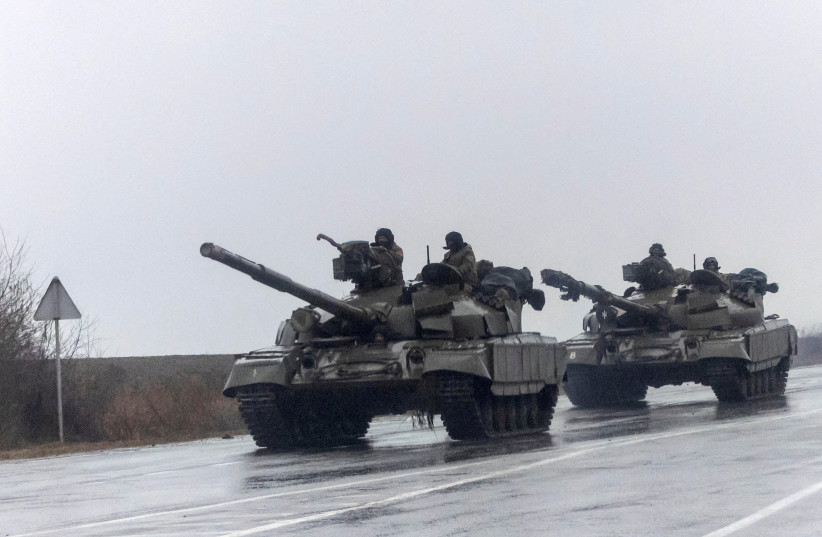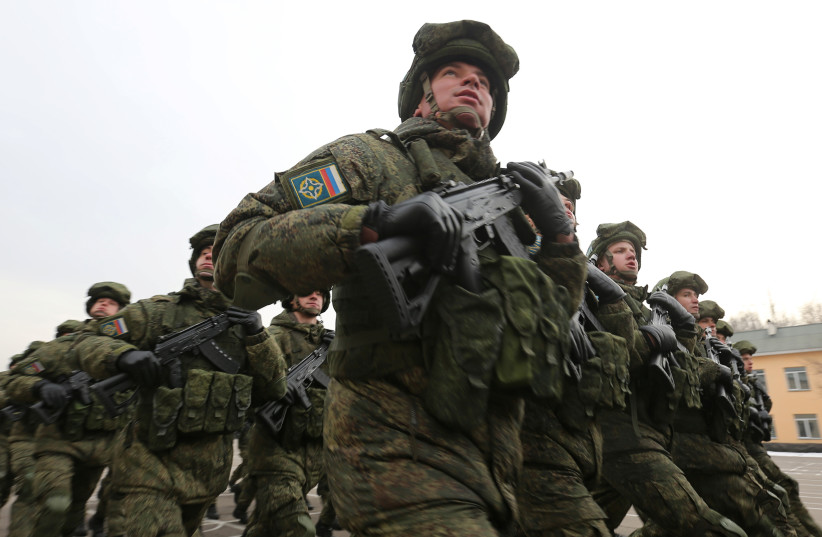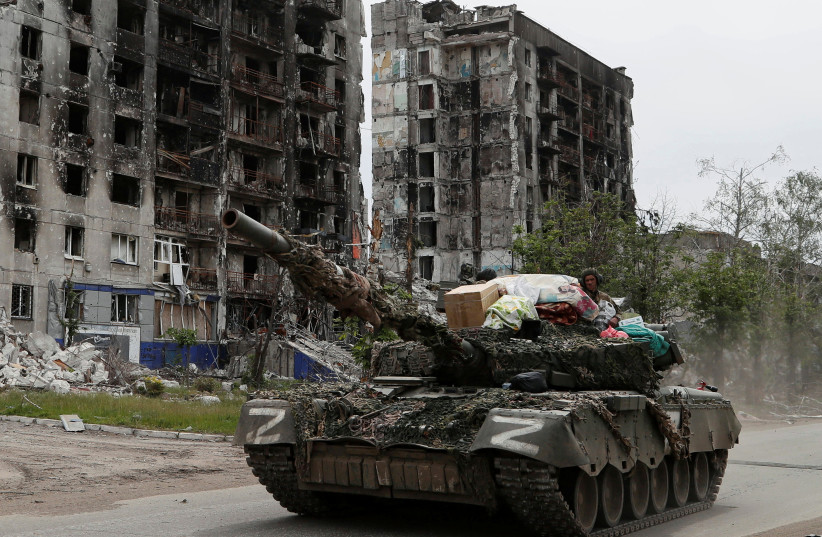This third phase includes mobilizing Russian troops in an effort to hold onto territory it has taken.

Russia’s decision to mobilize hundreds of thousands of men marks the beginning of a new phase in Moscow’s war against Ukraine. This third phase was solidified when Russia decided to annex four regions of its embattled neighbor.
Russia launched the first phase by invading Ukraine on February 24. It initially sought to conquer Kyiv through a lightning advance on the capital, hoping Ukraine’s leaders would flee to Lviv or leave the country. Although Western states had already left Kyiv, Russia failed in its initial advance and was pushed back.
Moscow then began phase two of the war: a grinding offensive in the East. This offensive culminated in Russian forces taking some towns and villages, including the eastern Ukrainian city of Severodonetsk in June. But that offensive also stalled and Russia was soon facing a Ukrainian counteroffensive in the south and east. Losing ground, Moscow then set upon this latest phase of the war.
This third phase includes mobilizing troops in an effort to hold onto territory it has taken. Russian President Vladimir Putin is pivoting away from recognizing the breakaway areas of Luhansk and Donetsk as independent countries and instead, annexing them. It is also annexing Zaporizhzhia and Kherson in the south.
Russia’s third phase in the war

Russia used its veto at the UN Security Council to prevent condemnation of its actions. Despite its actions being a flagrant violation of international law, Moscow will push ahead.
Now Russia has thrown down a new gauntlet by taking over a swath of southern and eastern Ukraine. On the one hand, this means Russia can claim that any Ukrainian counteroffensive is now an invasion of “Russia” because it has annexed these areas. On the other hand, it makes it harder for Ukraine to join NATO and other organizations because it is at war and Russia contests part of the country.
Russia’s goal then is to create an endless war in which Ukraine is even further away from re-taking Donetsk and Luhansk, let alone Crimea, which Russia annexed in 2014.
Now Moscow is showing the lines of its eventual claims. Russia hasn’t ever attempted something this ambitious. This is different from Crimea or even Russia’s conflict with Georgia in 2008. In the past, Russia created small, fake independent areas to recognize, but now it is showing that it is willing to take over territory and then annex it.
This will make it harder for Russia to mediate conflicts around the world since it can no longer pretend to adhere to international law.
Russia’s “new world order” plan
PUTIN’S SPEECH makes it clear that Russia wants to accelerate the creation of a new world order, one free from dealing with the West at all. At the UN, China, India and Brazil abstained from the vote, and Russia was keen to make sure that these countries were distanced from the West. These are the non-Western or global southern areas that Russia wants on its side to balance against the US in what it hopes to be a post-American world order, one where US hegemony and a unipolar US-led world are no longer possible.
Russia has been working with other international groupings, like the Shanghai Cooperation Organization, to build up an anti-Western world order. Now Moscow is throwing down the gauntlet, hoping that this is a new shift in the world order.

Moscow is also being accused of attacking the Nord Stream pipelines, meaning it is permanently cutting off Europe from its dependence on Russian gas. This reverses two decades of Russian policies. In essence, everything we are seeing in the war represents a whole new global phase of power and politics.
Putin hammered home this new phase in a speech on Friday. Many commentators described the speech as rambling and ranting, but Putin was clearly sketching out his view of the world’s future. He condemned the West for a variety of historical wrongs, starting with the colonial era and continuing with the UK’s treatment of India and the Allied bombing of Dresden in World War II.
He also attacked Western progressive values and made a pitch to the West’s far Right by claiming that Russia was leading the defense of family and children.
Putin said Russia is ready to negotiate on Ukraine, although he clearly hopes to leave behind a kind of rump state, or half of Ukraine in exchange for Kyiv while Russia runs four sections of the country plus Crimea and continues to threaten the rest.
RUSSIA’S UNPRECEDENTED actions will lead to an equal reaction in the West. The US support for Ukraine will grow. The attack on the Nord Stream pipelines will mean the West will now be on alert for more energy sabotage. This could have major ramifications for the Eastern Mediterranean and also Eastern Europe.
Putin’s decision to move to phase three is important because of this global shift. He has thought about it and gambled. Moscow continues to hint at the use of nuclear weapons. If that happens, it would be phase four of the war, representing Russia’s decision to abandon all of the world’s norms since the Second World War. Such a scenario would be a gamble: that the global South and China would still not side with the West when presented with nuclear threats.
That would put the West in an awkward position as Putin is forcing everyone to choose sides. So far, a large portion of the world has not chosen a side. This is unlike George W. Bush’s speeches after 9/11, in which he rallied the world to work with the US, saying, “Every nation, in every region, now has a decision to make. Either you are with us, or you are with the terrorists.” Today, however, Russia is gambling that the US can’t rally many countries to its side.
Back in 1990, George H.W. Bush had given a speech referencing a “new world order.” “We stand today at a unique and extraordinary moment,” he said. “The crisis in the Persian Gulf, as grave as it is, also offers a rare opportunity to move toward a historic period of cooperation.
“Out of these troubled times, our fifth objective – a new world order – can emerge: a new era – freer from the threat of terror, stronger in the pursuit of justice, and more secure in the quest for peace. An era in which the nations of the world, East and West, North and South, can prosper and live in harmony.”
Bush also referenced the new world and his discussions with then-Soviet leader Mikhail Gorbachev about these issues. “A world where the rule of law supplants the rule of the jungle,” he said. “A world in which nations recognize the shared responsibility for freedom and justice. A world where the strong respect the rights of the weak…. The test we face is great, and so are the stakes. This is the first assault on the new world that we seek, the first test of our mettle.”
Comparing those speeches to Putin’s, it is clear that Russia wants to reverse the course of the last several decades. In that respect, Moscow’s decisions in Ukraine serve as a challenge to the world and its established order.
As reported by The Jerusalem Post
